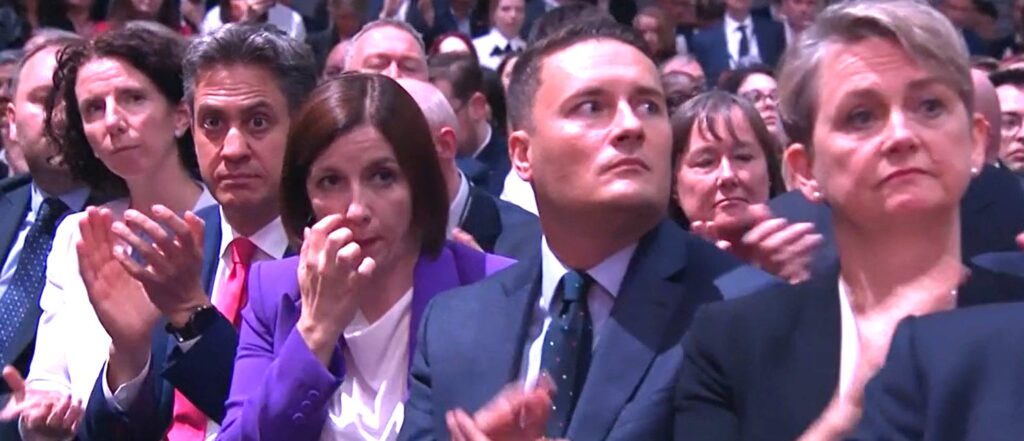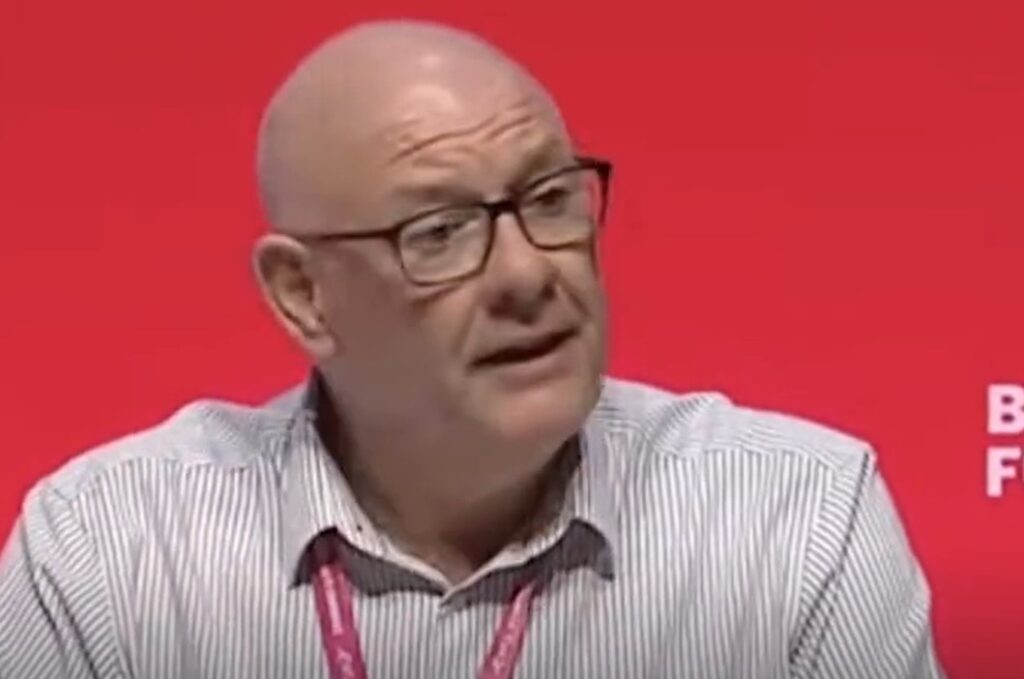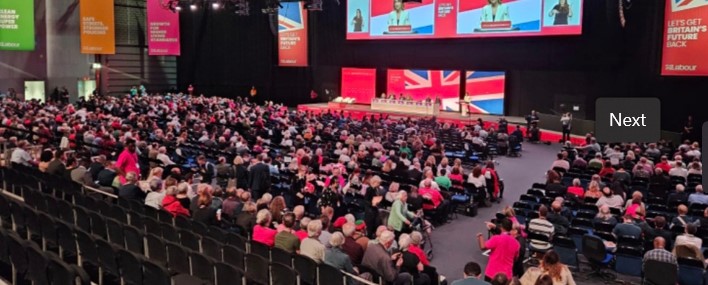By Ray Goodspeed, Leyton and Wanstead CLP delegate
Day three was focused mainly on the Leader’s speech, rights for women, and the New Deal for workers. The first bit of news delegates got in the morning, came in the CAC report, with the results of the voting for next year’s Conference Arrangements Committee. As could have been predicted, the left was thrashed yet again in the election of CLP reps by more than three to one.
As for the business of Tuesday morning, the main issue to be debated was women’s rights and violence against women. There was a resolution from the Labour Women’s conference one composite on the same subject from two CLPs.
This is an important issue and one that needs to be fully embraced by the labour movement as a whole and, as one would expect, there was nothing in the resolutions that socialists would oppose. There was general sympathy in the hall for the movers of the motions and no speakers (or votes) against either of them.
Ethics and Standards in Politics
Composite 9, on Ethics and Standards in Politics was an interesting one, in that it called for greater “trust in our political system”. It called for a ban on second jobs for MPs, a new “Integrity and Ethics Commission”, and a ban on ex-ministers lobbying (but only for five years). It was a timely resolution, given the rottenness and corruption that goes to the very heart of the Tory government and unsurprisingly, it was passed unanimously on a show of hands.
But it will also leave many Labour Party members wondering about issues not included specifically in the composite, but which would have been touched upon in the SHA resolution on the NHS, had that not been manoeuvred off the agenda. Where, for example, does the issue of ‘Ethics and Standards in Politics’ leave Labour MPs who get generous donations to their parliamentary offices from private individuals who are linked to lobbyists and similar companies? Certainly on the left, and among many middle-of-the-road Party members, there is a feeling that there should be a ban on lobbyists giving money to Labour MPs.
For the national media, of course, the highlight of the day was the speech by Keir Starmer, most of the content having been trailed in the press via press releases in the morning. As was the case last year, all kinds of councillors, Labour staffers, some lobbyists and willing visitors were ushered in beforehand, to fill any delegate’s allocated seat not occupied half an hour before Starmer’s speech. This was to guarantee a rapturous reception for the TV cameras.
Motherhood and apple-pie
It started in an unexpected and dramatic fashion. As he was about to speak, he was interrupted by a man who rushed the stage, protesting about who knows what, and throwing glitter. Starmer manages to milk the episode, and began his speech to great cheers, albeit still covered in glitter. It was yet another indication, if one were needed, that silly stunts like this, while they attract a bit of notoriety and celebrity, are often counter-productive.

Taken overall, the speech went down very well with conference, with most of the delegates (and all of the visitors) already committed to backing him and his lurch to the right. In that sense it was – especially for him – a effective politician’s speech, both for the conference hall and the media and the world outside.
There were nods towards the aspirations of younger voters on climate change, many reiterations of the need to get the NHS “back on its feet”, the need for “a million and a half new homes” and all of these were cheered during the many standing ovations that interrupted the speech.
He made a lot of comments, and asides and used many phrases and expressions that will undoubtedly chime with working people about the dire situation that they face today and their aspirations for something better and a secure future. And about the Tories just “looking after themselves”.
There were so many expressions of the kind that, on the face of it, would not be opposed by any voter in the street, even assuming they knew what Starmer meant. But most of it was meaningless platitudes, without including solid policy, phrased in exciting language to enthuse his audience.
We had Britain as a ‘force for good’, justice, opportunity, security, ‘Mission government’, future, a decade of growth, build, re-build, and so on, and so forth. He didn’t mention apple pie and motherhood, but he may as well have.
For a discerning socialist listening to his speech, what was more noticeable was the absence of the dreaded ‘s’ words – socialism or socialist – and an explicit support for the principle of the ‘market’ economy and the continuation of capitalism. “Private enterprise” Starmer said, “is the only way this nation pays its way in the world”.
“Fiscal responsibility is non-negotiable”
There were also scattered within the speech, several references to the stark realities that Labour will face managing a capitalist system in crisis. The way back from Tory failures, he explained, will be “hard”. “We won’t be dragged back to easy answers…fiscal responsibility is non-negotiable”. It is in these words – as it was with Rachel Reeves’ speech yesterday – that we see the clearest and most tangible clues as to how Labour will govern, once in office. The hidden subtext, is that everything else, besides fiscal responsibility, is negotiable.
What this means is that pro-working-class policies will only be introduced if British capitalism can afford them. Otherwise, they will not be forthcoming, and in fact – although this is also unspoken – we will have more austerity. That is the decisive issue that will face a Labour government in office, but, crucially, that is not understood by the majority of conference delegates today, and it is even less evident to workers in general and the voting public outside the conference hall.

Leaving aside those who are ideologically committed to capitalism, and the purely cynical careerists who were floating around the conference centre, there is a very large layer of ordinary activists attending conference, plus members at home and wider voters who desperately want to believe that a Starmer government will deliver tangible improvements to their lives. They can’t see, or don’t want to see, beyond simply removing this appalling, vicious government. They are prepared to suspend disbelief in Starmer and trust in hope. They are willing to give him the benefit of the doubt – for now! But if and when the disappointment finally kicks in, it will be a very different story.
What we have to see – which is something not understood by the ultra-lefts and the Facebook bubble – is that it will be the broad headlines and bullet-points of a speech like this that will be transmitted outwards, through the media, to the workplace and to conversations in the street. It is the promise of something better – or what is perceived as a promise – that will win the next election for the Labour Party. For that reason, as a calculated politician’s speech, Starmer’s address was an impressive achievement for him.
Workers’ rights – no back-sliding!
It was after Keir Starmer’s speech that conference resumed with a discussion workers’ rights, the crisis in our high streets, and equal pay for women (the second resolution submitted by the women’s conference).

The key take-away from this session was the desire of delegates to hold any future Labour government to their commitments on extending workplace and trade union rights for workers. The main Composite 11, moved by Dave Ward of the CWU and Matt Wrack of the FBU. The motion spells out that “Conference affirms there will be no regression from the New Deal”. It also supported the TUC 2023 policy to build mass opposition to Minimum Service Level laws “up to and including a strategy of non-compliance and non-co-operation to make them unworkable, including industrial action”
Dave Ward, in moving the motion, played tribute to all the strikers in the recent waves of industrial action, and was met with sustained applause and a partial standing ovation. He suggested that Starmer should take a leaf out of Biden’s book and appear at a picket line.
He made it clear that although he would support “you, Keir and Angela, we [the trade unions] will be your conscience”. Matt Wrack, from the FBU, also issued a stern warning about a future Labour Government buckling under pressure from lobbyists to water down the New Deal for Workers.
This composite, and indeed all the others from today, were passed virtually unanimously. Of course, the workers’ rights composite may have been nodded through by the right on the basis that it can just be ignored by Starmer later on, but it still puts down an important marker for the future.
I have already commented on this, but it really was remarkable how the chair gave the appearance of selecting speakers at random – “the woman over there in the green”, “the man with the red tie over there”, and so on. But by some strange psychic effect, every debate seemed to see a procession of Prospective Parliamentary candidates – who usually spoke on something completely unrelated to the subject apparently being debated. It was not something that happened in the Corbyn years.
Meanwhile, according to a report in Open Democracy, the right-wing think tank, the Adam Smith Institutue, has said it will be “expanding its network” into the Labour Party. It says it is ready to announce that a ‘Labour’ peer will become one of its patrons in the coming weeks. The reasoning?…the Executive Director of the Institute said that the ASI had been “interested” by some of Labour’s new policies. We bet they are.
The ASI, which does not declare its UK funders received the lowest possible transparency rating in openDemocracy’s ‘Who funds you?’ project. Delegates and Labour Party members as a whole are waiting to see which, if any Labour peer or MP has signed up to this outfit.
This may well be the last conference before the next election and the likely installation of a Labour government. In that sense it posed particular challenges for those who want to fight back against Starmer’s policies and his authoritarian abuse of party processes. Members are keen not to rock the boat and to focus solely on kicking out the Tories. The next conference may not be until 2025, possibly after a year of a Starmer government. In those circumstances the mood of the party – especially of the trade unions – could be very different indeed.



